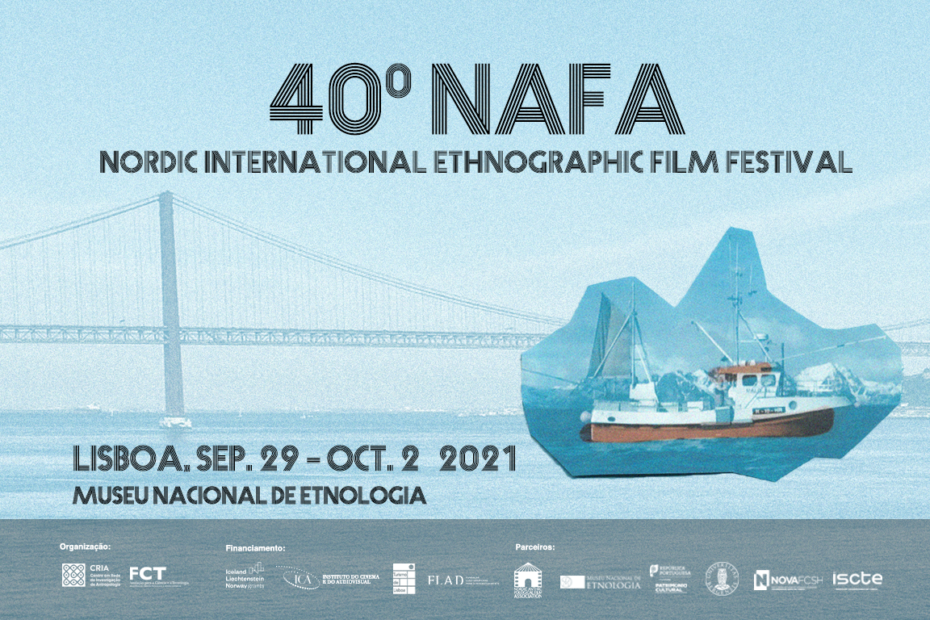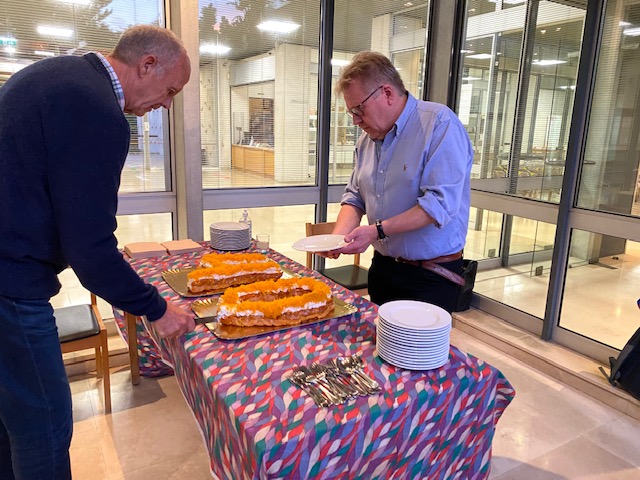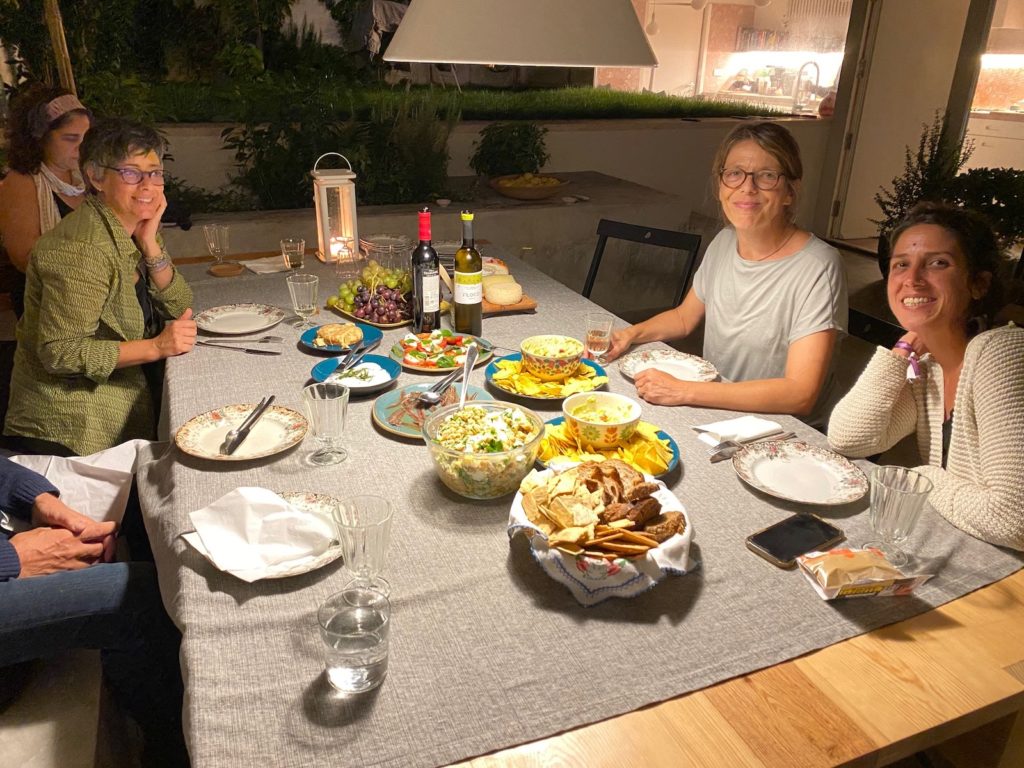The NAFA 40th International Film Festival took place at Museu Nacional de Etnologia, in Belem, Lisbon, Portugal, from 29th September until 3rd October 2021. And what a great gathering it was! After cancelling twice—2020 and June 2021—filmmakers, anthropologists and the public interested in social and cultural variations of the world could meet physically. The local organizers had prepared everything very well, and all parts of the festival went smoothly. The most crucial aspect, the famous NAFA spirit, was very well cared for from day one till the last morning of the final dinner party.
Many of the NAFA film festivals include a conference as part of the program to raise central topics within visual anthropology. This year’s conference was scheduled for the first day, preparing the audience to reflect on many issues related to anthropology and filmmaking, which again inspired the discussions of films screened the following days. The first day started with the opening plenary session on Archives and Indigenous Resistance. Len Kamerling (Alaska), who attended online, gave an exciting introduction based on his work with Alaska Native communities. Eva Toulouse and Livio Niglas (Estonia), presenting in person, discussed challenges in filming rituals among Udmurt people in Southern Russia. To address the wide variety of the performance of rituals locally and over time, the filmmakers made sure to record several different performances of the same ritual, and not ‘standardize’ the performances as part of the filmmaking process.
The second part of the conference included discussions on Subjective Collaboration, introduced by Angela Torresan, and Ontologies of the Sea, highlighting synergies between Norway and Portugal. The film Christmas Dinner by Catarina Alves Costa (Portugal) and Frode Storaas (Norway) had its premiere, followed by presentations by Henriette Dybwad (Norway) and Tiago Bartomeu Costa (Portugal). These two sessions ran parallel to Museums and ethnographic film production, introduced by Elizabeta Koneska (North Macedonia), and Rethinking the Rural through the Anthropocene with Alice McDowell (Ireland). The festival attendees received the sessions at the conference very well, and during the coffee breaks, people had the chance to meet and greet in the courtyard, socialize, and discuss the events further.
The selection committee had the difficult task of selecting and putting together a program from the close to 200 submitted films this year. All NAFA festivals have the policy of not having parallel screenings, limiting the number of total films to the advantage that all audience members watch the same films and thus have common references for discussions throughout the festival. The selection committee, chaired by Peter Crawford, had done an excellent job, and outstanding films were screened during the four days of the festival.
Closer to God (85′) by Anette Berger (present for Q&A), Lars Barthel, and Grete Jentzen (Switzerland) opened the festival in the evening of the first day. An astonishing film shot in India and Pakistan, following a classical singer and a mystic Sufi. It is a highly professional and expensive production not commonly seen at NAFA festivals. Still, the way it was beautifully shot and edited with calm, long takes made it a perfect fit for an anthropological film festival acclaimed by the audience.
More controversies followed Newtopia (88′), a personal documentary by Audun Amundsen (Norway). The film is about the filmmaker as he returns with a camera and solar panels to a pure, unspoiled tribal community deep in the jungle of Indonesia he had visited as a backpacker a few years earlier. While he is there, the modern world creeps in, plastic takes over from natural materials, dangerous chemicals as Roundup are introduced for clearing bushes for horticulture, and the need for cash develops. The film starts with the filmmaker in ‘selfies’-kind of shots on a riverboat on his way back to the jungle and, as some would argue, the rest of the film continued like that; close on the filmmaker’s feelings and disappointments to what is happening to his friends in the jungle. A film screened later during the festival by Pierre Boccanfuso (France), In search of the Shaman (95′), shot in one of the last remote regions in the Philippines, touched upon similar themes as Newtopia, but with a completely different approach. In this case, the filmmaker is not part of the story and is never seen in the film. Pierre underlined in his Q&A that he had no shots of himself. Audun (Newtopia) commented that he could have edited his film the same way as Pierre but chose his personal approach as he felt it was a more honest and authentic way to present his story about them.
Reflexivity has been a returning theme within anthropology since Writing Culture (Clifford and Marcus 1979). Instead of an ‘entomologist’ approach ‘observing people as insects,’ “anthropology should be based on a métissage des regards, an investigation which is never complete and in which the Western I is involved in a continuous discovery of the Self in the Other (Marc Piault quoted by Paul Henley, London Book of Reviews Vol.23 no.12 2001). Exactly the point put forward, to an extreme, in another controversial film presented at the festival, Maasai Speak Back (106′) by Vanessa Wijngaarden. In this film, Dutch tourists and Maasai villagers looked at and commented on sequences shot when they earlier met in Tanzania. “The surprised, emotional, and ashamed reactions culminate in revealing, regretful and sincere dialogues, facilitated by the camera,” the filmmaker wrote. However, the audience also felt embarrassed and awkward, something that might have been intended. Unfortunately, the filmmaker, living in South Africa, was prevented from travelling to Portugal due to the ongoing Covid-19 restrictions.
For most films, the filmmakers were present for Q&A, the programming organized well, with enough time for discussions. Polite and positive comments followed most films, no surprise, as the productions were tremendous and had, after all, been selected as the top 10% of the films submitted. However, some interesting contradicting views came up. Flower season (24′) by Tiago Carvalho (not present), an observational film from Brazil on family lives during the first days of harvesting the valuable golden grass flowers, was criticized for the missing overall narrative. Others praised the film for the same reasons. This discussion stands for more and less contradicting views of filmmakers interested in anthropology versus anthropologists interested in filmmaking, which has been a returning debate in the history of NAFA film festivals since the beginning: Colin Young, the first director of The National Film and Television School at Beaconsfield, UK, told his students to, of all film festivals, go to the NAFA festivals as that was where they really could discuss and learn. Colin Young was also a pivotal person to formulate the general principles of ‘observational cinema,’ which is still one of the more common approaches within anthropological filmmaking. However, as we could see from the films screened in Lisbon, anthropological film festivals as NAFA’s are open to various ways of filmmaking.
This short review does not leave the space to mention all the beautiful films screened at the festival, and with this, I warmly invite others who participated in adding and commenting on how you experienced the NAFA 40th International Film Festival in Lisbon.
A huge thank you to the organizers who worked so hard to get all the support from EEA grants, embassies and others to host the guests so generously.
The entire program introducing each film screened at the festival can be checked here.
The presentations at the conference are available here.

NAFA 40th International Film Festival, Lisbon, 2020, Photo: ©Ragnhild Aasvang 
NAFA 40th International Film Festival, Lisbon, 2020, Photo: ©Ragnhild Aasvang 
NAFA 40th International Film Festival, Lisbon, 2020, Photo: ©Ragnhild Aasvang 
NAFA 40th International Film Festival, Lisbon, 2020, Photo: ©Ragnhild Aasvang




